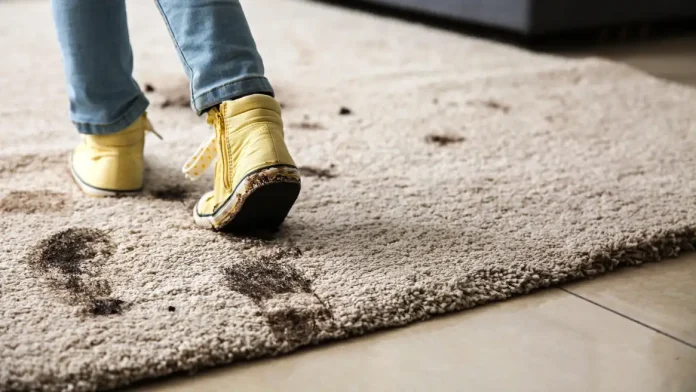While some people love the feel of carpet on their bare feet, others think it’s the worst flooring ever and the first thing they’ll remove when they move out. It’s not just the aesthetics that make people dislike carpet. Carpet is hard to keep clean, and no matter what you do, it’s often only superficially clean.
What’s wrong with carpet?
Studies show that carpet “acts as a reservoir of contaminants.” This means that dust, insects and the skin and hair we shed every day can get caught in carpet hairs and “re-suspend” them in the air as we walk. Even “clean” carpets can release large amounts of volatile organic compounds (VOCs). All of these factors can affect your health.
But what if you don’t like carpet, but you live in a rental home that is all carpet? Your landlord probably won’t let you DIY a new floor covering, so you’ll have to live with carpet. If you have carpet and are concerned about the impact on your health, there are things you can do to minimize that concern.
Establish a “no shoes in the house” rule.
One of the easiest and most effective ways to do this is to have a firm “no shoes inside” policy. The outside world is basically made up of dirt, and our shoes absorb not only dirt, but also pesticides, salt from melting ice, animal feces, and everything else that sticks to our carpets.
Placing a rug or doormat in the entry hallway is also effective because it concentrates the dirt from the carpet in one place. When combined with the practice of removing shoes, an entryway carpet can greatly reduce the amount of contaminants entering the home.
Vacuum once a week
One of the most important aspects of maintaining a healthy carpet is vacuuming. The pile of carpet is full of dust, dirt and bacteria that are released into the air every time you walk on it.
Vacuum your carpet at least once a week, taking the time to go back and forth in a crisscross pattern to remove dirt. Vacuums are equipped with HEPA (High Efficiency Particulate Air) filters that prevent tiny debris from coming out of the vacuum and circulating in the air.
Finally, any spills or stains should be treated immediately with a natural cleaner. Leaving stains untreated can turn your carpet into a bacteria factory, and using harsh chemical cleaners can further deteriorate indoor air quality. A simple cleaner using vinegar, dish detergent and baking soda will remove most stains without causing headaches.
Annual Steam Cleaning
Even with regular vacuuming, carpets collect a lot of dirt over the course of a year, so it is recommended that they be steam cleaned once a year. The key here is “dry steam cleaning,” which combines very low moisture with a powdered detergent and high heat to clean and disinfect carpets without making them wet. Traditional steam cleaning is also very effective at cleaning, but it takes longer to dry and can lead to mold growth if the drying process is not attended to.
Whichever method you choose, deep cleaning your carpets once a year will help prevent dangerous contaminant buildup. It will also extend the life of your carpet, keeping it “like new” for longer.
Ventilate for better air flow
Finally, consider the air flow in your home. Carpets can absorb dirt and bacteria and release them into your home, or release gases that can affect your health. To combat these problems, it’s important to improve the ventilation in your home. If you have central air conditioning, make sure the filters are new and clean, and that the ducts have been recently serviced. On sunny days, open windows and doors to let in fresh air and use fans to circulate the air.










